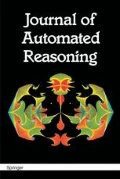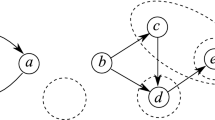Abstract
This paper deals with automated deduction for classical and partial logics, especially for the three-valued logic L3, which has been introduced, for example, in the study of natural language semantics. Based on ideas from a Plaisted's Gentzen style system for classical two-valued logic, we present a new tree-structured proof procedure (TMPR) together with a new completeness proof using proof transformation techniques and some improvements including the generation and use of lemmata. TMPR extends SLD-resolution with a Prolog-style backward chaining to full first-order logic by a controlled use of case analysis. This is done without having to extend negative goals needed, for example, for model elimination. A classification of TMPR, model elimination and related calculi in a common tableau framework is given. Thereafter, we present our extension of the TMPR proof procedure to L3 and show its soundness and completeness. As a side result, a TMPR proof system for the four-valued logic L4 is given. Finally, the restriction of TMPR to ‘L3-Horn clauses’ is considered, and, additionally, an idea for similarly extending model elimination and related systems to L3 (and L4) is illustrated.
Similar content being viewed by others
References
Barwise, J. and Perry, J.,Situations and Attitudes, Bradford Books, Cambridge, Mass., 1983.
Bibel, W.,Automated Theorem Proving, Vieweg. Braunschweig, Wiesbaden, 1982.
Blau, U.,Die dreiwertige Logik der Sprache, De Gruyter, Berlin, New York, 1978.
Fenstad, J. E., Halvorsen, P.-K., Langholm, T., and van Benthem, J.,Situations, Language and Logic, D. Reidel, Dordrecht, 1987.
Gabbay, D. M., N-prolog: An extension of Prolog with hypothetical implication (Part 2).J. Logic Programming 4 (1985), 251–283.
Gabbay, D. M. and Reyle, U., N-Prolog: An extension of Prolog with hypothetical implication (Part 1).J. Logic Programming 4 (1984), 319–355.
Hähnle, R., Towards an efficient tableau proof procedure for multi-valued logics. In LNCS 533, Proc. (Computer Science Logic CSL'90), Heidelberg, Germany, 1990, pp. 248–260.
Langholm, T., Algorithms for partial logic, University of Oslo, Department of Mathematics, COSMOS-Report 12, 1989.
Loveland, D. W., A simplified format for the model elimination procedure,Journal of ACM 16 (1969), 349–363.
Loveland, D. W.,Automated theorem proving: A Logical Base. North-Holland, Amsterdam, 1978.
Loveland, D. W., Near-horn prolog and beyond,J. Automated Reasoning 7 (1991), 1–26.
Mellouli, T., Einsatz einer dreiwertigen Logik für die Verarbeitung natürlicher Sprache in NALOG, Technical Report KI-NRW 91–37 of the Forschungsverbund “Anwendungen der Künstlichen Intelligenz in NRW”. University of Paderborn, 1991.
Mellouli, T., A three-valued TMPR proof procedure and its use for handling presuppositions and vagueness, Extended version of a talk held at the internat. seminar on ‘Non-Classical Logics in Computer Science’, Dagstuhl, Germany, 20–24 Sept. 1993. (Submitted for publication.)
Mellouli, T.,Tree-structured theorem proving using controlled case analysis mechanisms for classical, three-, and four-valued logic (with non-classical applications), Doctoral thesis, Forthcoming, University of Paderborn, 1994.
Plaisted, D. A., A simplified problem reduction format,Artif. Intell. 18 (1982) 227–261.
Plaisted, D. A., Non-Horn clause logic programming without contrapositives,J. Automated Reasoning 4 (1988) 287–325.
Plaisted, D. A., A sequent style model elimination strategy and a positive refinement,J. Automated Reasoning 6 (1990) 389–402.
Reed, D. W. and Loveland, D. W., A comparison of three prolog extensions,J. Logic Programming 12 (1992) 25–50.
Schmitt, P. H., Computational aspects of three-valued logic, in LNCS 230,Proceedings CADE 8, Oxford, England, 1986, pp. 190–198.
Schönfeld, W., Prolog extensions based on tableau calculus, Proc. 9th Intern. Joint Conf. on Artificial Intelligence (IJCAI'85), Vol. 2, Los Angeles, California, 1985, pp. 730–732.
Schönfeld, W., Tableau calculus as a base for logic programming (unpublished manuscript) & personal discussions, IBM Scientific Center in Heidelberg, Germany, 1989/90.
Author information
Authors and Affiliations
Additional information
This work is supported by the ‘KI-Verbund NRW’, founded by the Ministry for Science and Research of North Rhine Westphalia and by the ‘Deutsche Forschungs Gemeinschaft’ in the scope of the research topic ‘Deduktion’, and is an extended version of a talk held at the German-Japanese Workshop on Logic and Natural Language (23–25 October 1990, in Kyoto, Japan).
Rights and permissions
About this article
Cite this article
Mellouli, T. TMPR: A tree-structured modified problem reduction proof procedure and its extension to three-valued logic. J Autom Reasoning 12, 47–87 (1994). https://doi.org/10.1007/BF00881843
Received:
Issue Date:
DOI: https://doi.org/10.1007/BF00881843



